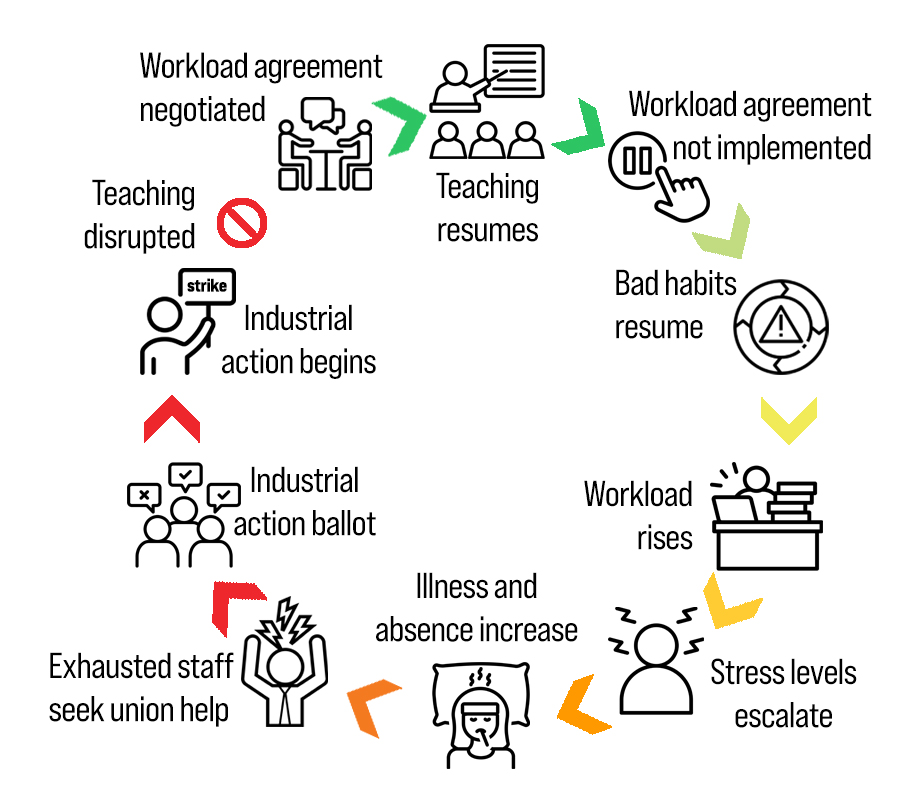
The most valuable resource schools have to benefit their learners is their teaching staff. However, just like money, buildings, photocopying paper, and board-markers, teacher time is a limited resource. Therefore the tasks teachers are assigned, and the time needed to achieve these tasks, must be carefully managed by school leaders if we are to deliver world class education to our children.
The value, limitations, and proper management of teachers’ time has been the subject of multiple workload agreements in the four decades since the “Jordanstown Agreement”, all of which have the twin aims of reducing teacher workload and maximising the use of teachers’ time to benefit learners. Yet excessive workload remains top of the list of reasons why teachers are leaving, or planning to leave, the profession. Why are almost 40 years of workload management agreements failing to have an impact when transferred from the page to the classroom?
We believe the answer is simple: the workload agreements – for a multitude of reasons – are simply not being fully implemented in schools. Since the instructions to manage workload aren’t being followed, workload expands to exceed the human resource available. Before you can say “industrial action vote”, the situation reaches a crisis once again.

“A heavy workload happens when an employee’s workload exceeds what should be expected of them, in terms of the amount of hours or intensity of work. Usually, excessive workload results from an employee having to go beyond the routine range or level of duties for their position, and can be a result of different organizational factors like cutting budget costs, unfair treatment at work, lack of role transparency, and lack of support from managers.” (runn.io)
Think1265 is a teacher-led campaign which aims to break this cycle, and ensure that the invaluable, yet limited, resource of teacher time, is used in the most effective way possible for our young people. We want to work with everybody – employers, school leaders, unions and teachers – to implement properly our existing workload agreements, and find the answer together to a simple question going forward:
What if teachers’ workload actually worked?
Too busy to read on? Here’s how you can help right away:
Sign our petition calling for Paul Givan, the Education Minister, to ask schools to implement our think1265 Charter, and employ a Best Practice approach to implementing the workload reduction agreements you already have. Share the site on Facebook, Twitter (X), Pinterest, Instagram, or WhatsApp!
Got a few more minutes? Here’s the low-down on what think1265 is all about.
During the industrial action which finished in springtime, teachers across Northern Ireland were engaged in “Action Short of Strike Action”, or “ASOSA”. Because excessive workload was central to the issues teachers were in dispute about, teachers refused to engage with a significant number of tasks that they would typically be asked to do by school managers. This left teachers largely free to focus on their core role: facilitating the teaching and learning of our young people.
Teachers weren’t working fewer hours than they were contractually meant to; rather they were using those 1265 hours differently. By focusing their attention toward tasks that benefited teaching and learning, teachers found that they could complete their professional duties within their working day, with sufficient time left over in their working week to prepare and develop better lessons for their learners.

Tellingly, student performance in Northern Ireland remained high, while teachers reported an increase in their general welfare. Many commented on how great it was to finally get some time to focus on their family or themselves instead of bringing their job home with them every day. But now there are already signs that the bad old days are about to return.
The Workload Vicious Cycle
Excessive workload in a school leads to a vicious cycle from which nobody benefits, and think1265 believes that the principal (not Principal… most of the time) reason this cycle happens is because workload agreements are not fully implemented in a school. And this is not simply to do with school leaders – although it is their responsibility to implement these instructions. Rather teachers themselves are also to blame, because we don’t know and we don’t stand up for our rights.
Similarly many Principals can’t implement workload agreements properly because they simply don’t understand what’s required of them, or properly equipped with useful tools to help them achieve this.

Additionally many teachers are worried about “rocking the boat”, not realising that the workload agreements are designed to help everyone in the school – not least the students they teach. In a similar vein some Principals – good leaders who have a sense for the realities within their school – are frightened to implement DTBs properly, simply because there is not enough human resource in the system to manage the necessary workload. Teaching has changed dramatically since the Jordanstown Agreement, and what was perhaps reasonably straightforward in 1987 is proving to be a Herculean task with the demands on modern teaching staff.
It’s complex and it’s something of a muddle, but unless it gets sorted out the vicious cycle will continue, year after year.
think1265 aims to change all that, and break the workload vicious cycle.
Think1265 has three very simple strands, and they all centre around the most effective use of the 1265 hours of directed time that Principals can direct teachers to work.
1. Educate.
We’re putting together as detailed and clear a guide as possible about what teachers’ rights and Principal’s obligations are with regard to Directed Time, breaking it up into specific issues you might want more clarity about. By knowing what the rules and regulations actually say about X,Y and Z, teachers and their Principals can have proper professional conversations about using their 1265 hours in the most impactful way for the learners, while maintaining a high quality work-life balance at the same time.

2. Equip.
We’re building tools and guides to help people – including school leaders – sort through the Directed Time Budgets, and ensure that they are planned properly and realistically in good time for the academic year. After all, everyone in a school has the same objective – to do the best for their students. The first step in doing that is managing the available resources, and the most precious resource available is teachers’ time.

3. Campaign.
Overarching the other two strands is our “think1265 charter,” which are 10 simple “Best Practice” aspirations for schools to work toward. This will ensure that teachers’ workload and work-life balance is placed at the top of the agenda in school planning.
Alongside this we have a petition for all stakeholders – teachers, support staff, parents, managers – to sign, calling on Paul Givan, the Education Minister, to ask schools to sign up to our charter as a Best Practice approach to their obligations under the agreements between teachers and management side.

If all of us – teachers and school leaders – finally implement our workload agreements, we can build a better education system for everyone.
Summer break in:
(Note – you’re not paid for summer holidays, so leave your work on your desk.)
Designed and produced by teachers and trade unionists. While every effort has been made to ensure the accuracy of information on this site, teacher and union representatives are advised to contact their own trade union reps before taking action which might leave them in breach of contract. Think1265 uses WordPress, which uses cookies for functionality. Think1265 does not use any cookies for any purpose other than those used by WordPress for site functionality, and no personal information is retained or processed by think1265 without users’ specific permission. © 2025 think1265
